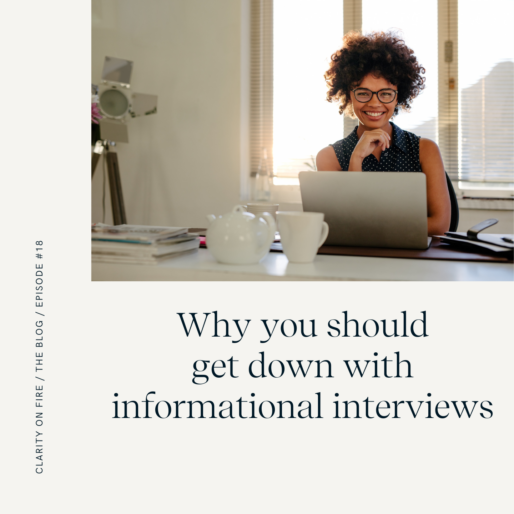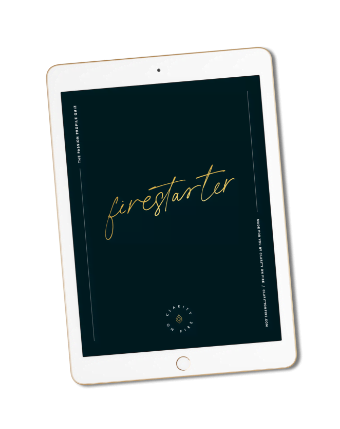If reading long blogs just isn’t your deal, you can listen to me read it instead! Click the play button below, or subscribe and listen through our podcast on iTunes, Stitcher, or Google Play.
Podcast: Play in new window | Download
As far as career coaches go, I’m pretty unconventional. As in, I don’t care much about the things that “career experts” usually tend to obsess about.
I’m not interested in helping you write the perfect résuméor the most professional-sounding cover letter. (I’d much prefer that you reveal your humanity and personality throughout all phases of the application process, rather than sound like a highly skilled robot.)
I don’t believe in “best practices” when it comes to job searching. (I don’t care what worked for someone else. I care what’s going to work — and feel good along the way — to YOU.)
I have zero interest in writing “listicles” about “The 5 smartest job search strategies” or “7 interview tips you NEED to know.” (Yawn … aren’t there enough of those online already? I’m not here to add to the overwhelm.)
And, maybe most counterintuitively, I don’t care at all about helping you “crush it” in your career, advance up the ranks, and become traditionally successful. (I do, however, deeply care about helping you get clear on who you are and what you want, and then align your career accordingly.)
But there is one aspect of traditional career advice that I can fully get on board with: the informational interview.
Although I may not like them for the reasons you think…
(What can I say, the rebel is strong in me.)
WHAT’S THE *REAL* POINT OF INFORMATIONAL INTERVIEWS?
I know most people recommend informational interviews because of the connections you’ll make and the potential doors they can open. And I agree — those are great reasons!
But I actually think that the mostvaluable part of informational interviews is the candid glimpse you can get into an industry, company, or specific job. Because that’s how you can determine if a job is really going to suit you in ALL the ways — your strengths, your personality traits, your values, your lifestyle, your desires, your Passion Profile, etc.
When all you have to go on is a short online job description, some fluffy website copy, and the enthusiastic comments from a chipper HR person, it’s really hard to tell if a job is actuallyright for you.
It’s like trying to get to know someone through their Instagram feed, where they only share the touched-up highlight reel of their life. You’re not getting the whole picture.
The beauty of informational interviews is that you get to talk to someone who has been or is currently in it. You can ask them all the questions you wish you could ask in an interview (like, “Is the boss a micro-managing jerk?”or “How much annoying busywork will I have to do every day?”), and get honest, behind-the-scenes answers.
And because the person you’re interviewing isn’t affected by whether or not you decide to go for the job, they have no reason to be anything but totally honest with you.
Which is why it’s just as valuable (if not MORE valuable) to set up informational interviews with people who are in positions or companies you’re interested in, not justinfluencers who can open doors for you. (Because who cares if someone can open a door for you if you’re not sure you want to walk through it anyway?)
HOW TO FIND THE RIGHT PEOPLE TO TALK TO
So how do you find the right people to set up informational interviews with?
Well first, it’s always helpful to ask around. If you know you’re interested in a certain company or type of job, share that with your friends and family and ask if they know of anyone you should talk to. It’s always nice to have a personal introduction, when you can.
This is also what LinkedIn was made for.
Let me preface this by saying I’m SO not a LinkedIn expert. To put it in perspective, I signed in to LinkedIn the other day only to see that I had contact requests from 4 months ago that I had somehow missed. (Insert hand-smacking-forehead emoji here.) Yeah, I suck at social media.
BUT, if you’re even slightly better at LinkedIn than me, it can be an incredible tool for helping you find great people to connect with.
Look for people who are in jobs that sound intriguing to you or who are working for your dream company. Then send them a short, thoughtful, personal note — either through LinkedIn, or better yet, to their direct email address, if you can find it. Explain why you’re reaching out and that you’d be extremely grateful for the chance to talk with them briefly to get a better sense of what they do.
The truth is, you won’t hear back from everyone. Don’t take it personally!
They may (like me) be terrible at checking LinkedIn, or in a busy phase at work, or super introverted and awkward about chatting with strangers, or any number of things. Don’t take it as a rejection — just move on to the next person.
Eventually you’ll hear back from someone who’s willing to chat with you. And all you need is one or two people to get started! Then they can lead you to the next person to talk to, who can lead you to the nextperson, like following a breadcrumb trail.
ASK THESE TWO QUESTIONS AT THE END
Once you have an informational interview set up, it helps to come up with a list of questions that you’d like to ask. Again, this is your chance to ask about all the things you *really* want to know about the job/company, so don’t hold back.
But don’t get so attached to your list of questions that you forget to be present in the conversation. Sometimes a seemingly random tangent ends up answering a question you didn’t know you had, so let the conversation flow organically.
Then, as you’re wrapping up the interview, I always have my clients ask these two questions at the end:
- Based on our conversation today, what opportunities do you know of that I should be looking into?
- Who do you suggest I talk to next?
That way, you never feel like an informational interview is a dead end. These questions will give you the next breadcrumb to follow along the trail, so you can keep your momentum going.
TAKE WHAT FEELS GOOD AND LEAVE THE REST
I want to end with a few words of caution as you start setting up informational interviews…
First, keep in mind that you’re not trying to copy anyone else’s journey.
It can be tempting to think, “Well she got her MBA before getting this job, so maybe I should go get my MBA,” but remember that their path doesn’t have to be your path. You’re looking to get ideas and inspiration, not to emulate someone else.
Also, people are sharing their personal experiences with you, which means they’ll alsobe sharing their personal opinions and biases with you, too. But that doesn’t make them fact.
Run everything they say through your personal gut-check. Ask yourself, “Am I resonating with that? Does that have to be true for me?”
Plus, it’s always good to hear multiple people’s stories so you can start to determine the difference between one person’s experience and recurring patterns.
And lastly, don’t feel like informational interviews are just for people who are actively job searching. You can do this simply because you’re curious to find out what else is out there, even if you’re not currently in the market for a job.
Now I’d love to hear from you: What experience do you have with informational interviews? What questions or advice do you have about getting the most out of them? Share with me (and everyone else) in the comments!
Much Love,
Kristen (& Rachel)


